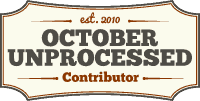
As I was driving back to work with my questionably sourced fruit, my brain started doing its thing. Why was the pineapple only 87¢? Don’t you know that when something is that cheap, there’s a price to pay? Do you enjoy being a pawn in big agro’s game? So when I got back to my desk, I started Googling. Turns out Costa Rica uses the most insecticides of any country in the world and GMO pineapples would soon be introduced there. Exactly when is “soon?" I thought. Was my big-juicy-sweet-yellow-cheap-thang a dirty, little GMO tramp or a suitable, inexpensive suitor? Regardless, the thrill was gone, and cheap-thang would be going back to the store. Sure, it was only 87¢ and hardly worth my while, but it was the principle. I didn’t want to create the demand for it. And besides, the store was on my way home, so my carbon footprint wouldn't be compromised.
When I was leaving work for the day, my office mate (the one I cheated with last year), saw me carrying the pineapple. I told him it was only 87¢ and that I was returning it. "Only 87¢? I love pineapple," he announced. Then, upon the realization that returning it was more for my sake than for any real impact on the system, I offered it to him. I knew the cashier would probably just nod at me like when you're trying to placate a deranged person who's telling you about some secret society on Mars, and that would be the end of it. Besides, office mate was really excited about the prospect of acquiring a shiny, new pineapple. That is, until I ruined it for him. I'm pretty sure I could buzz kill anything with one strategically placed zinger. Call me gifted.
"It's from Costa Rica who uses more pesticides than any country in the world,” I said. “You want it?"
"Hmmm. Well, maybe not then."
“No, really," I said. "You can have it. You love pineapples, and I was expecting too much from my boycott.”
“No, that’s ok. If my wife wanted me to have a pineapple, she would have bought me a pineapple.”
I paused, scrunched up my face and crinkled my crow’s feet. “If you want a pineapple, you don’t need permission to have a pineapple," I said. "Here, take it.”
“No, that’s ok.”
“No, I really want you to have it.”
“Thanks, but I’ll pass.”
“Take the freaking pineapple!”
“What about the pesticides?”
“Your wife doesn’t buy organic fruit or shop at the farmers’ market,” I said. “This would have been the one she would have bought you if she wanted you to have one.”
Ten minutes later, as I gazed into the cashier’s vacuous eyes, I said, “I’d like to return this pineapple.”
"Okay. I owe you 87¢" he said, and handed me three quarters, a dime and two pennies.
“Thanks,” I said as I put the change in my wallet and walked out of the store. Pineapples, pesticides, partners, primates...I give up.
Related Links:







I don't think you have the status of the Shameluss Hussy anymore, since he refused your sweet treat. Excellent post.
ReplyDeleteHilarious! Thanks for the enlightening chuckle.
ReplyDeleteWhat I want to know is how the affair ended. Is he no longer your office mate? Do you now eat in the ladies room? Come on, tell all.
ReplyDeleteBring back another pineapple and erase the Eco-guilt with another guilt. What is impact of his fussy consumerism on Juan and Maria?
ReplyDeleteCosta Rican pesticide use may be above average, but is it disproportionate to the bio-threat when you consider the immense species density in Costa Rica? Life in Costa Rica is so prolific and hardy that it takes a lot of poison to induce death. Weeds, for example, seem to shrug off herbicides. Bio-threats to the pineapple crop include fungi, nematodes, and insect pests. Pesticides—used as liberally and unstintingly as machine guns at the Somme—mean exports, jobs, and economic growth to Costa Ricans. The pineapple and banana crops are to Costa Rica what corn and soybeans are to Iowa. What is the economic alternative? Could organic pineapple cultivation ever produce an equivalent boost to the Costa Rican economy? Do we want Costa Rica to be exporting pineapples to us, or cocaine? If Costa Rican judges were gunned down by drug lords because we're too pure to eat pesticides, whose fault would that be?
"Can you face the moral responsibility of not eating this pineapple…?"
Joshua
Joshua: Now with the vast proliferation of pesticides, weeds are becoming resistant to these chemicals and super weeds are growing, forcing farmers to use three times the amount of pesticides. It blows onto other farms, including organic ones, contaminating the non-GMO crops. Now scientists have even found the Roundup herbicide in rain water. Nature is broken, thanks to Monsanto. Juan and Maria would do just fine without big ag!
ReplyDeleteAgh! I see it's mate in three. I resign.
ReplyDeleteJoshua
i love it!
ReplyDeleteI enjoyed reading thiis
ReplyDelete